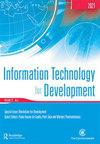大流行病中的大流行病:面对数据化世界中的社会经济不平等
IF 5.1
3区 管理学
Q1 DEVELOPMENT STUDIES
引用次数: 10
摘要
疫情暴露并加剧了早在COVID-19传播之前就困扰世界的不平等现象。尽管在医学和技术方面取得了进步,但西方世界的大部分地区对其人民面临的问题没有做好准备。随着死亡人数和死亡率在现代前所未见,在一些民粹主义政权的数据化世界中,在肆虐的感染大流行中见证了额外的大流行。在不断变化的世界中,宽带互联网接入对于使人们能够在封锁和/或隔离期间过自己的生活变得越来越重要。人们习惯于通过移动和/或其他设备访问医疗保健信息、资源和提供商,以获取他们的COVID - 19信息,同时使用移动应用程序进行跟踪和追踪。那些处于边缘的人很容易受到数字生物政治或政府和公司利用数字手段最大化知识和控制人口的努力的影响,以获得政治和经济权力。在这个数据化的社会里,越来越多的数据监控为激进主义和争取人权和自由提供了理由。这也被称为数据化大流行,通过获取工具、基本服务和社会环境,人们的生活比以往任何时候都更多地依赖于互联网。在这些数字鸿沟中,全球化的力量带着危险和希望向前发展。这篇社论探讨了这些问题,并根据本期的论文提出了应对流行病的方法。ICT4D的研究为我们共同创造一个更美好的世界提供了途径。本文章由计算机程序翻译,如有差异,请以英文原文为准。
Pandemics within the pandemic: confronting socio-economic inequities in a datafied world
ABSTRACT The pandemic has brought to light and exacerbated inequities that have plagued the world even before COVID-19 spread. Despite its medical and technological advances, much of the western world was unprepared for what its people faced. With a death toll and mortality rates unseen in modern times, the datafied world amidst some populist regimes witnessed additional pandemics within the pandemic of raging infections. In the changing world broadband internet access is becoming more essential to enabling people to lead their lives while locked-down and/or in quarantine. People become accustomed to accessing healthcare information, resources and providers through mobile and or other devices for their COVID 19 information, while tracking and tracing is being carried out using mobile applications. Those at the margins become vulnerable to digital biopolitics or efforts by governments and corporations to maximize knowledge and control of populations using digital means for political and economic power. In this the datafied society, increased data surveillance offered cause for activism and fight for human rights and freedoms. This also referred to as the datafied pandemic in which life revolves on the internet more than ever through access to tools, basic services, and social environments. Within these digital divides, the forces of globalization forge ahead with perils and promises. These issues are explored in this editorial and ways of tackling the pandemics offered in the light of papers in this issue. ICT4D research offers ways in which we may together create a better world for all.
求助全文
通过发布文献求助,成功后即可免费获取论文全文。
去求助
来源期刊

Information Technology for Development
Multiple-
CiteScore
11.30
自引率
16.70%
发文量
34
期刊介绍:
Information Technology for Development , with an established record for publishing quality research and influencing practice, is the first journal to have explicitly addressed global information technology issues and opportunities. It publishes social and technical research on the effects of Information Technology (IT) on economic, social and human development. The objective of the Journal is to provide a forum for policy-makers, practitioners, and academics to discuss strategies and best practices, tools and techniques for ascertaining the effects of IT infrastructures in government, civil societies and the private sector, and theories and frameworks that explain the effects of IT on development. The concept of development relates to social, economic and human outcomes from the implementation of Information and Communication Technology (ICT) tools, technologies, and infrastructures. In addition to being a valuable publication in the field of information systems, Information Technology for Development is also cited in fields such as public administration, economics, and international development and business, and has a particularly large readership in international agencies connected to the Commonwealth Secretariat, United Nations, and World Bank.
 求助内容:
求助内容: 应助结果提醒方式:
应助结果提醒方式:


